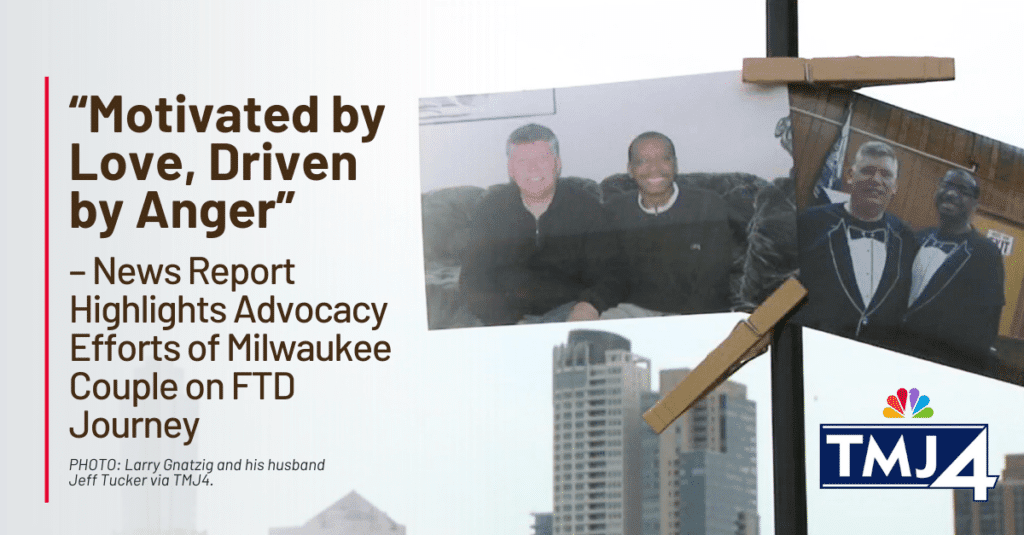“Motivated by Love, Driven by Anger” – News Report Highlights Advocacy Efforts of Milwaukee Couple on FTD Journey

A June 30 report by the Milwaukee news station TMJ4 highlighted the advocacy efforts of church administrator and care partner Larry Gnatzig and his husband Jeff Tucker, who was diagnosed with FTD, and shared the experiences of their FTD journey so far.
Gnatzig first met Tucker online in 1996, meeting in person after six months of chatting – Gnatzig remembers thinking “this is the guy” when first meeting Tucker. The couple would eventually move in together in Milwaukee and later get married. But in 2015, Gnatzig began to notice changes in Tucker’s behavior.
“The first thing that I noticed was his lack of interest, I guess,” said Gnatzig. “He was just quiet. He would sit for hours and hours and not talk.”
After visiting the doctor, Tucker was diagnosed with FTD. “I had to tell him that he has this dementia,” Gnatzig said. “There’s no treatment for it, and you will die from it.”
Like many others on the FTD journey, Gnatzig and Tucker found few supports available for them. To make matters worse, they were initially denied Medicaid disability services by county authorities. According to Gnatzig, the screening used to check Tucker’s neurodegeneration was poor, only checking for physical impairments and glossing over cognitive impairment. Gnatzig believes that they may have faced discrimination during this initial attempt.
“So, this is the aura. You can feel the aura in the room that this [case worker] did not want to be here,” Gnatzig said.
After repeated follow-up calls with county and state officials, Gnatzig secured a second screening for Tucker, which helped them finally obtain disability services through Medicaid. Gnatzig notes that his and Tucker’s case prompted a requirement that county workers take LGBTQIA+ sensitivity training.
As the article highlights, Gnatzig’s advocacy has taken him well beyond Milwaukee. Among other accomplishments, Gnatzig joined representatives from the Alzheimer’s Association to lobby the federal government to change the law allowing those with early-onset dementia access to services typically reserved for people over 60.
After Tucker surpassed his doctor’s initial life expectancy of five to seven years, Gnatzig says that every day they have left together is worth the struggle for the moments when Tucker shows flashes of his pre-FTD self.
“All he had was to put his hand on my shoulder,” Gnatzig. “But everything he had was in that hand. And to this day, I don’t know if I’m ever going to get that again. But all I do is just wait because he could come back.”
Larry Gnatzig previously shared his insights on self-care as a care partner in a blog post published as part of WebMD’s “My Experience” series; click here to learn more.
Members of the LGBTQIA+ community can face extra hardships on their FTD journey. Click here to read a Help & Hope guest feature about the LGBTQIA+ experience as shared by care partner Richard Ruben.
By Category
Our Newsletters
Stay Informed
Sign up now and stay on top of the latest with our newsletter, event alerts, and more…

